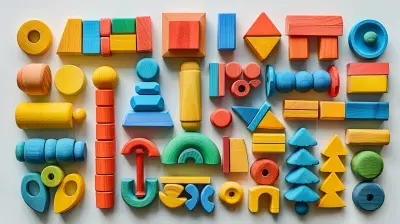Supporting Language Development in Preschool Children
21 March 2025
Language development is an essential part of every child’s early years. It’s how they express thoughts, build relationships, and understand the world around them. As parents and caregivers, supporting this growth can feel overwhelming, but it doesn’t have to be. Simple, everyday interactions can make a world of difference.
So, how can you help your preschooler strengthen their language skills? Let’s dive into practical and effective strategies to boost early language development while keeping things fun and engaging.

Why Is Language Development Important in Preschoolers?
Language is the foundation of communication, learning, and social interaction. A strong vocabulary and speech skills help children:- Express their emotions and needs
- Interact confidently with peers and adults
- Build cognitive and problem-solving skills
- Prepare for reading and writing in school
Delays in language development can affect future academic success and social interactions. That’s why nurturing these skills early on is so important.

Stages of Language Development in Preschoolers
Understanding the milestones of language development can help you track your child's progress and offer the right support.Age 2-3 Years
- Uses two to three-word phrases (“want cookie,” “go park”)- Names familiar objects and people
- Follows simple instructions (“Get your shoes”)
- Begins to ask “what” and “where” questions
Age 3-4 Years
- Forms three to five-word sentences- Starts using basic grammar (like plurals and simple past tense)
- Engages in short conversations
- Asks “why” and “how” questions
Age 4-5 Years
- Speaks in full sentences with more complex grammar- Tells short stories or describes events
- Asks a lot of “why” questions
- Uses a vocabulary of 1,500+ words
Each child develops at their own pace, but if you notice significant delays, a speech therapist can provide guidance.

How to Support Language Development at Home
Now, let’s get to the good stuff—how you can actively support your child’s language development at home!1. Talk, Talk, Talk!
The more you talk to your child, the more words they’ll learn. Narrate your day, describe objects around you, and ask open-ended questions. Instead of “Do you want juice?” try “What would you like to drink—milk or juice?”2. Read Together Daily
Reading is one of the best ways to enrich vocabulary and comprehension. Choose books with colorful pictures and engage your child by asking them to guess what happens next. Picture books, nursery rhymes, and interactive stories work wonders!3. Sing Songs & Rhymes
Songs and rhymes help children develop rhythm and memory, making it easier to recall words. Classics like “Twinkle, Twinkle, Little Star” or “The Wheels on the Bus” are excellent choices.4. Encourage Storytelling
Ask your child to tell you what they did during the day. Let them make up their own stories using toys or puppets. This builds confidence and improves sentence structure.5. Play Pretend Games
Role-playing games, like playing “restaurant” or “doctor,” encourage conversation and storytelling. These activities expand vocabulary while making communication fun and natural.6. Listen and Respond Thoughtfully
When your child speaks, give them your full attention. Show interest by responding with more than just “yes” or “no.” If they say, “I saw a big dog!” you can reply, “Wow! Was it brown or black? Did it bark?”7. Expand Their Sentences
If your child says, “Want cookie,” you can respond with, “You want a chocolate cookie? That sounds yummy!” This encourages them to use longer and more detailed sentences.8. Limit Screen Time
While educational TV shows can be helpful, nothing replaces real conversations. Too much screen time can reduce the number of meaningful interactions your child has throughout the day.9. Introduce New Words Naturally
Instead of saying, “That’s a big car,” you could say, “That’s a huge truck!” This introduces synonyms and a richer vocabulary without making it feel like a lesson.10. Play Word Games
Simple games like “I Spy” (“I spy something red and round…”) encourage word recognition and conversation. Other fun options include rhyming games and “What’s this?” object-naming activities.
When to Seek Professional Help
While some children are late talkers and catch up naturally, language delays can sometimes signal a need for intervention. Consider reaching out to a speech therapist if your child:- Says very few words by age 2
- Struggles to form simple sentences by age 3
- Has difficulty understanding directions
- Is often frustrated due to communication struggles
- Shows little interest in talking or engaging socially
Early intervention can significantly improve language development, so don’t hesitate to seek help if needed.
Supporting Bilingual Language Development
If your household speaks more than one language, you might wonder if it will confuse your child. The good news? Bilingualism offers cognitive benefits and does not delay language development. Here’s how to support a bilingual preschooler:- Use both languages consistently – Speak naturally in both languages at home.
- Encourage communication in both – Respond to your child no matter which language they use.
- Read bilingual books – Storytelling in both languages strengthens vocabulary.
- Be patient – Some bilingual children may mix languages at first, but this is normal and temporary.
Final Thoughts
Boosting your preschooler’s language skills doesn’t require fancy programs or expensive tools. The best way to support their growth is through daily conversations, reading, singing, and play. Every moment is a teaching opportunity, so embrace the chatter, the “why” questions, and the silly stories—they’re all part of your child’s journey into the fascinating world of language.If you’ve been looking for ways to help your little one become a confident communicator, start implementing these simple yet powerful strategies today. Who knows? You might even hear them use a new word tomorrow!
all images in this post were generated using AI tools
Category:
Parenting PreschoolAuthor:

Maya Underwood
Discussion
rate this article
8 comments
Runeveil Stewart
This article offers valuable insights on nurturing language skills in preschoolers. Simple activities like reading together, singing, and engaging in conversation can make a significant impact. Remember, consistency is key! It's all about creating a language-rich environment. Great tips for parents looking to support their child's communication growth!
April 6, 2025 at 2:52 PM

Maya Underwood
Thank you for your insightful comment! I'm glad you found the tips helpful for fostering language development in preschoolers. Consistency truly makes a difference!
Faryn Fisher
This article highlights essential strategies for nurturing language skills in preschoolers. I appreciate the practical tips on engaging activities and the emphasis on creating a language-rich environment. Encouraging conversation and reading together can truly make a difference in their development. Thank you for sharing!
April 2, 2025 at 4:36 PM

Maya Underwood
Thank you for your kind words! I'm glad you found the strategies helpful for fostering language development in preschoolers. Happy reading and engaging!
Eleanor Huffman
Forget the flashcards! Real conversations and messy storytime magic are the keys to unlocking those tiny tongues. Let’s talk, laugh, and let their imaginations soar!
April 1, 2025 at 4:20 PM

Maya Underwood
Absolutely! Engaging in real conversations and storytelling is vital for fostering language skills and creativity in young children. Let's prioritize interactive learning!
Zorion Bishop
Encouraging conversation and reading fosters essential language skills in preschoolers.
March 31, 2025 at 3:28 PM

Maya Underwood
Absolutely! Engaging conversations and reading are vital for nurturing language skills in preschoolers, laying a strong foundation for their future communication abilities.
Celeste Gonzalez
Great insights! Language development is crucial at this age, and your tips are incredibly helpful for parents. Thank you!
March 29, 2025 at 3:56 PM

Maya Underwood
Thank you for your kind words! I'm glad you found the tips helpful for supporting language development.
Jacob Clarke
Every word shared nurtures their bright future.
March 26, 2025 at 4:56 PM

Maya Underwood
Thank you! Every interaction truly shapes their potential.
Imani McNair
This article beautifully highlights the importance of nurturing language skills in our little ones. Every small conversation and interaction makes a significant difference. Thank you for sharing these valuable insights!
March 23, 2025 at 5:48 AM

Maya Underwood
Thank you for your kind words! I'm glad you found the article insightful and valuable for supporting our children's language development.
Claire McWain
Thank you for sharing these insightful strategies for supporting language development in preschoolers! It's crucial to create a nurturing environment for their growth. I can't wait to implement these tips!
March 22, 2025 at 4:19 PM

Maya Underwood
Thank you for your kind words! I'm glad you found the strategies helpful and hope they make a positive impact on the children you support. Happy implementing!
MORE POSTS

How to Support Your Baby's Fine Motor Skills with Everyday Activities

Fostering Self-Reliance in Young Children

The Power of Personalized Family Traditions

How to Build Emotional Resilience in Your Child

Discipline Strategies for Sibling Rivalry and Conflict Resolution

Potty Training in a Montessori Home: Independence and Freedom